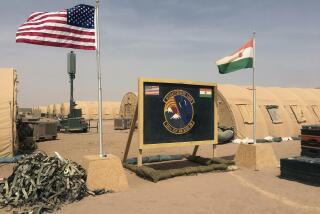DEFENSE / PORT CALL : U.S., Singapore Haggle Over Military Accord : Who gets legal jurisdiction over American personnel could be a sticking point.
- Share via
SINGAPORE — When a U.S. naval task force led by the carrier Midway steamed into Singapore’s harbor last month on its way to the Middle East, it was an indication of the close military relationship that Washington enjoys with this tiny island nation.
But the visit of several thousand U.S. sailors was also a reminder that despite more than a year of negotiations, the two countries have been unable to resolve their differences over a formal agreement granting the United States increased access to military facilities in Singapore.
A Western diplomat familiar with the talks said an agreement was “90% completed,” but the remaining 10% could take several more months of negotiations to resolve.
Under the proposed agreement, the United States would have permanent access to naval shipyard facilities in Singapore to service its vessels. It would also keep a squadron of F-16s on virtual constant rotation at Paya Lebar airfield, a joint military-civilian air base.
The agreement would provide for the stationing of 180 to 200 U.S. military personnel permanently in Singapore, although both U.S. and Singapore officials have studiously avoided the word bases in referring to the arrangement. The U.S. Navy now maintains a staff of just 10 sailors in Singapore to provide supplies to visiting ships.
The talks with Singapore come at a time when the Philippine government has made clear its determination to take over control of two big U.S. bases--Clark Air Base and Subic Bay Naval Base--when their leases expire next September.
When Singapore proposed that the United States make greater use of its facilities in 1989, it said the main reason was to show Philippine President Corazon Aquino that it is willing to share the burden of an American military presence in the region. But the proposal immediately caused an outcry in neighboring Indonesia and Malaysia that has only recently died down.
Singapore is still a firm proponent of a stable U.S. military presence in the region.
According to Western diplomats and Singapore officials, the main sticking point in the facilities talks is the question of legal jurisdiction over sailors and airmen while they are on Singapore territory. The United States wants the Singaporeans to hand over lawbreakers to face trial under U.S. military law.
But Singapore has refused to relinquish jurisdiction. Officials said they are particularly sensitive about Singapore’s drug laws, among the toughest in the world, which provide for the death penalty for possession of small amounts of heroin and other narcotics.
Diplomats said the possibility of U.S. military personnel being put to death for infractions considered relatively minor in the United States could make getting the deal through Congress difficult.
A Singapore official said his government will not relinquish its jurisdiction but might agree to consult with U.S. authorities before charges are brought against any serviceman.
More to Read
Sign up for Essential California
The most important California stories and recommendations in your inbox every morning.
You may occasionally receive promotional content from the Los Angeles Times.













